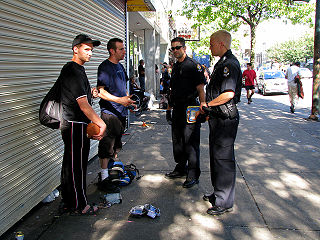Related Research Articles

Theft is the act of taking another person's property or services without that person's permission or consent with the intent to deprive the rightful owner of it. The word theft is also used as a synonym or informal shorthand term for some crimes against property, such as larceny, robbery, embezzlement, extortion, blackmail, or receiving stolen property. In some jurisdictions, theft is considered to be synonymous with larceny, while in others, theft is defined more narrowly. Someone who carries out an act of theft may be described as a "thief".
Robbery is the crime of taking or attempting to take anything of value by force, threat of force, or by use of fear. According to common law, robbery is defined as taking the property of another, with the intent to permanently deprive the person of that property, by means of force or fear; that is, it is a larceny or theft accomplished by an assault. Precise definitions of the offence may vary between jurisdictions. Robbery is differentiated from other forms of theft by its inherently violent nature ; whereas many lesser forms of theft are punished as misdemeanors, robbery is always a felony in jurisdictions that distinguish between the two. Under English law, most forms of theft are triable either way, whereas robbery is triable only on indictment. The word "rob" came via French from Late Latin words of Germanic origin, from Common Germanic raub "theft".

In law, fraud is intentional deception to secure unfair or unlawful gain, or to deprive a victim of a legal right. Fraud can violate civil law or criminal law, or it may cause no loss of money, property, or legal right but still be an element of another civil or criminal wrong. The purpose of fraud may be monetary gain or other benefits, for example by obtaining a passport, travel document, or driver's license, or mortgage fraud, where the perpetrator may attempt to qualify for a mortgage by way of false statements.
Larceny is a crime involving the unlawful taking or theft of the personal property of another person or business. It was an offence under the common law of England and became an offence in jurisdictions which incorporated the common law of England into their own law, where in many cases it remains in force.
Embezzlement is a crime that consists of withholding assets for the purpose of conversion of such assets, by one or more persons to whom the assets were entrusted, either to be held or to be used for specific purposes. Embezzlement is a type of financial fraud. For example, a lawyer might embezzle funds from the trust accounts of their clients; a financial advisor might embezzle the funds of investors; and a husband or a wife might embezzle funds from a bank account jointly held with the spouse.
In criminal law, property is obtained by false pretenses when the acquisition results from the intentional misrepresentation of a past or existing fact.
Bank fraud is the use of potentially illegal means to obtain money, assets, or other property owned or held by a financial institution, or to obtain money from depositors by fraudulently posing as a bank or other financial institution. In many instances, bank fraud is a criminal offence. While the specific elements of particular banking fraud laws vary depending on jurisdictions, the term bank fraud applies to actions that employ a scheme or artifice, as opposed to bank robbery or theft. For this reason, bank fraud is sometimes considered a white-collar crime.

The Theft Act 1968 is an Act of the Parliament of the United Kingdom. It creates a number of offences against property in England and Wales. On 15 January 2007 the Fraud Act 2006 came into force, redefining most of the offences of deception.

A fiduciary is a person who holds a legal or ethical relationship of trust with one or more other parties. Typically, a fiduciary prudently takes care of money or other assets for another person. One party, for example, a corporate trust company or the trust department of a bank, acts in a fiduciary capacity to another party, who, for example, has entrusted funds to the fiduciary for safekeeping or investment. Likewise, financial advisers, financial planners, and asset managers, including managers of pension plans, endowments, and other tax-exempt assets, are considered fiduciaries under applicable statutes and laws. In a fiduciary relationship, one person, in a position of vulnerability, justifiably vests confidence, good faith, reliance, and trust in another whose aid, advice, or protection is sought in some matter. In such a relation, good conscience requires the fiduciary to act at all times for the sole benefit and interest of the one who trusts.
A fiduciary is someone who has undertaken to act for and on behalf of another in a particular matter in circumstances which give rise to a relationship of trust and confidence.
Dishonesty is to act without honesty. It is used to describe a lack of probity, cheating, lying, or deliberately withholding information, or being deliberately deceptive or a lack in integrity, knavishness, perfidiosity, corruption or treacherousness. Dishonesty is the fundamental component of a majority of offences relating to the acquisition, conversion and disposal of property defined in criminal law such as fraud.
Uttering is a crime involving a person with the intent to defraud that knowingly sells, publishes or passes a forged or counterfeited document. More specifically, forgery creates a falsified document and uttering is the act of knowingly passing on or using the forged document.

The Theft Act 1978 is an Act of the Parliament of the United Kingdom. It supplemented the earlier deception offences contained in sections 15 and 16 of the Theft Act 1968 by reforming some aspects of those offences and adding new provisions. See also the Fraud Act 2006.
"Deception" was a legal term of art used in the definition of statutory offences in England and Wales and Northern Ireland. It is a legal term of art in the Republic of Ireland.

Possession of stolen goods is a crime in which an individual has bought, been given, or acquired stolen goods.
Commissions are a form of variable-pay remuneration for services rendered or products sold. Commissions are a common way to motivate and reward salespeople. Commissions can also be designed to encourage specific sales behaviors. For example, commissions may be reduced when granting large discounts. Or commissions may be increased when selling certain products the organization wants to promote. Commissions are usually implemented within the framework on a sales incentive program, which can include one or multiple commission plans.
Obtaining pecuniary advantage by deception was formerly a statutory offence in England and Wales and Northern Ireland. It was replaced with the more general offence of fraud by the Fraud Act 2006. The offence still subsists in certain other common law jurisdictions which have copied the English criminal model.
Obtaining property by deception was formerly a statutory offence in England and Wales and Northern Ireland.
At law, cheating is a specific criminal offence relating to property.
Obtaining a money transfer by deception was formerly a statutory offence in England and Wales and Northern Ireland.
In Canada, trade secrets are generally considered to include information set out, contained or embodied in, but not limited to, a formula, pattern, plan, compilation, computer program, method, technique, process, product, device or mechanism; it may be information of any sort; an idea of a scientific nature, or of a literary nature, as long as they grant an economical advantage to the business and improve its value. Additionally, there must be some element of secrecy. Matters of public knowledge or of general knowledge in an industry cannot be the subject-matter of a trade secret.
References
- ↑ Lister v Stubbs (1890) 45 Ch D 1, CA
- 1 2 Attorney-General's Reference (No 1 of 1985) [1986] QB 491, CA
- ↑ Law Commission (2002) 3.39-3.40, 4.40-4.45
- ↑ R v Rashid (1977) 64 Cr App Rep 201, CA
- ↑ R v Doukas [1978] 1 All ER 1061, CA
- ↑ Law Commission (2002)
- ↑ R v Cooke [1986] 1 AC 909
- ↑ Fraud Act 2006, s.4